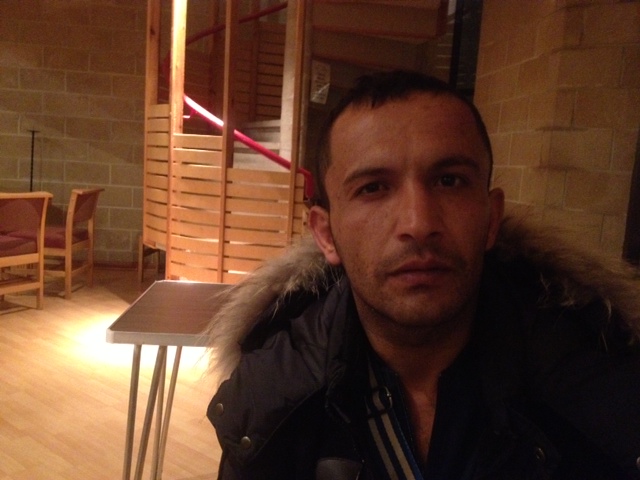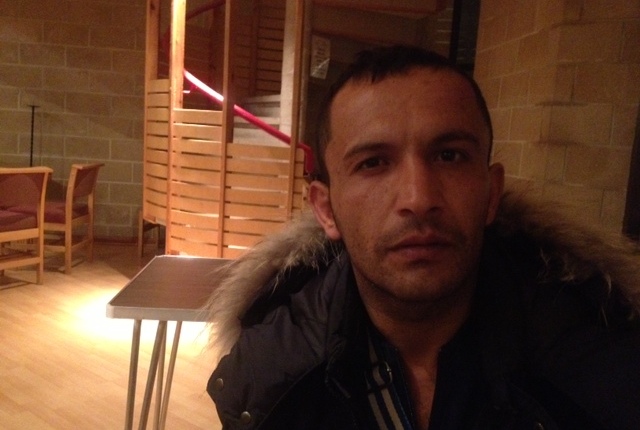
Mohammed came into this south-east London food bank in search of help. But he feels no sense of belonging here any more – and seems disconnected from the events taking place around him.
He’s a casualty of war. He made the journey from Iraq to the UK in 2005 as a stowaway on a lorry, when he was 22 years old. His father, one of Saddam Hussein’s policemen, had been killed. The terrible trip took three or four weeks. To this day he doesn’t know what happened to the rest of his Kurdish family. They ran away to Syria and he lost track of them after that.
He’s homeless now and his asylum case has been refused. He can’t work, because he hasn’t got the immigration status to do that. Feeling that he’s come to the end of the line here in England, he wants to return to Iraq. The UK Immigration Services won’t let him, given the ongoing insurgency. Now 33, Mohammed is drinking heavily and depressed. Some days, when he doesn’t have a drink, he starts shaking. ‘I drink too much and I’m thinking about my family.’ He’s had enough of life on the streets of London, where he sleeps when he can’t find a place on the floor of a pub. Some nights he sleeps at the train station or at a homeless shelter. On a few occasions he is allowed to stay at a friend’s flat.
It’s cold and he doesn’t feel it would be any more dangerous in Iraq than it is here. ‘I have no home – nowhere to go. Two weeks ago I saw someone stab a person with a knife on the streets. Sometimes you see very dangerous people. Three months ago someone attacked me. He punched me in the mouth and I lost a tooth.’ His health is deteriorating. ‘I went to the GP today and told him I can’t eat properly.’ He showed me some medicine he’s been given.
In 2008 Mohammed ended up in prison for a year, followed by a 17-month spell in a detention centre because of his immigration status. Mohammed says all he had done was to ask someone for a cigarette – ‘but the man said I robbed him’. He says that he challenged the detention at High Court and ‘won the case – I should have got £60,000, but they gave me £5,000. His girlfriend at the time stood by him while he was in detention and offered good support. But the relationship foundered.
He was sent to hospital for help to overcome his addiction to alcohol, but the detox therapy would have cost £4,800 and the Immigration Services refused to fund it. He has to check in with the Immigration Services regularly to prove he’s still in the country. Because he is destitute he can’t afford the train ticket. So every time he travels by train he runs the risk of a fine he can’t pay – followed by a trip to court and potentially another conviction for a criminal offence.
This Trussell Trust food bank was able to give Mohammed a supply of three days non-perishable food. This food is long life, and much of it needs to be cooked or heated. That’s a problem, because Mohammed normally has nowhere to cook it. He’s homeless. On the night we met he was trying hard to contact a friend to see if he could sleep at his home. I spoke to one of the volunteers at the food bank, who said how difficult it can be to ‘signpost’ people such as Mohammed, to try to get them some help. There don’t seem to be any avenues left for him.
Mohammed told me he often sleeps on the night buses that connect the centre of London to the outer suburbs. ‘It’s not just me – there are many people who do this. People without houses.’
You don’t have to be an asylum seeker to be at risk of homelessness in the UK. A recent analysis of government data by the University of St Andrews on behalf of Shelter, found that one in 8 UK households are surviving on low incomes while paying unaffordable housing costs. This is putting them under huge financial pressure, and ‘more than one in 10 working families in England have had to sell possessions to cover their housing costs’. A two-bedroom flat in London costs up to £1,470 in rent, with many remaining empty and unlet for months because many public sector workers and pensioners just can’t afford them.
Next time you’re in London on a night bus, try looking around to work out how many people are there because they have nowhere else to go. But you might find that everyone is staring at you.
Many thanks to Mohammed for sharing his experiences of life as an asylum seeker in London.
